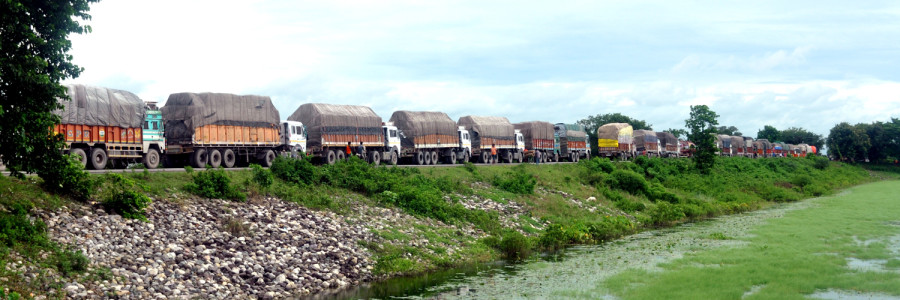Money
Freight forwarders say new cargo tracking system has increased costs
Traders pay Rs4,200 extra per container to fit the electronic device.
Rajesh Khanal
Freight forwarders on Monday complained that the electronic cargo tracking system recently launched by the government had raised transportation costs by 25 percent, despite assurances that it would make shipping cheaper.
Electronic tracking uses the Global Positioning System, a satellite-based radio navigation system, and allows the shipper to keep track of consignments. Along with the system, Nepal has also received transshipment privileges from Indian authorities under which goods imported from third countries undergo customs clearance directly at the customs points on the Nepal-India border.
The government has been implementing the electronic tracking and the transshipment on Nepal-bound cargo released from Kolkata, Haldiya and Visakhapatnam ports in India since mid-February. The system permits electronic documentation.
While the system has reduced the transportation time from 21 days to four to five days, it is also expected to help traders save on shipping costs by freeing them from demurrage and detention charges. To use the system, traders need to pay Rs4,200 extra per container to fit the electronic tracking device.
But freight forwarders said they were being forced to pay higher consignment charges after the new system was enforced. Rajan Sharma, past president of the Nepal Freight Forwarders Association, said shipping companies had hiked the cost of cargo handling to Rs125,000 from Rs100,000 per container.
According to him, shipping lines give only a four-day concession period for empty containers to be returned from Birgunj to Kolkata after they are unloaded. “If there are delays, the companies charge an additional $100 per container per day,” said Sharma.
He said that the limited capacity of Sirsiya Dry Port in Birgunj to handle containers had also pushed up costs. “With the congestion at the dry port, it is difficult to send back the empty containers within the given time limit,” Sharma said.
Prakash Singh Karki, president of the association, said shipping companies at Indian ports had been imposing additional surcharges under different headings. “Showing the cause of rise in labour costs and the need to train manpower at the ports, shipping companies have raised the cost of handling consignments bound for Nepal,” said Karki.
Cargo forwarders also suspect the intervention of customs agents behind the hike in freight charges. When the system was launched in February, customs handling agents at Indian ports had disrupted the movement of Nepal-bound cargo. Upset by the loss of income they had been earning by using the manual system, the agents showed their dissatisfaction by stopping the movement of goods.
Currently, six shipping lines are providing services to Nepali traders. Among them, Maersk Line handles around 60 percent of the cargo destined for Nepal, according to the Consulate General of Nepal in Kolkata.
Consul General Ek Narayan Aryal said traders and freight forwarders had been complaining about the excessive hike in transportation costs by shipping lines.
“As there are a small number of companies handling Nepal-bound cargo, they might have used their monopoly to raise freight charges,” said Aryal, adding that Nepal should use more shipping companies to check such malpractices.
Aryal said the system had helped minimise documentation costs along with detention and demurrage charges for Nepali traders. “We are holding talks with the shipping companies and the Indian port authority to solve the problem,” he said.
According to Aryal, cargo movement via Visakhapatnam port increased significantly after the government enforced the tracking system and transshipment. “The system has removed the need for documentation at Indian ports, and it could reduce transportation costs if the malpractices are removed,” said Aryal.




 9.7°C Kathmandu
9.7°C Kathmandu















